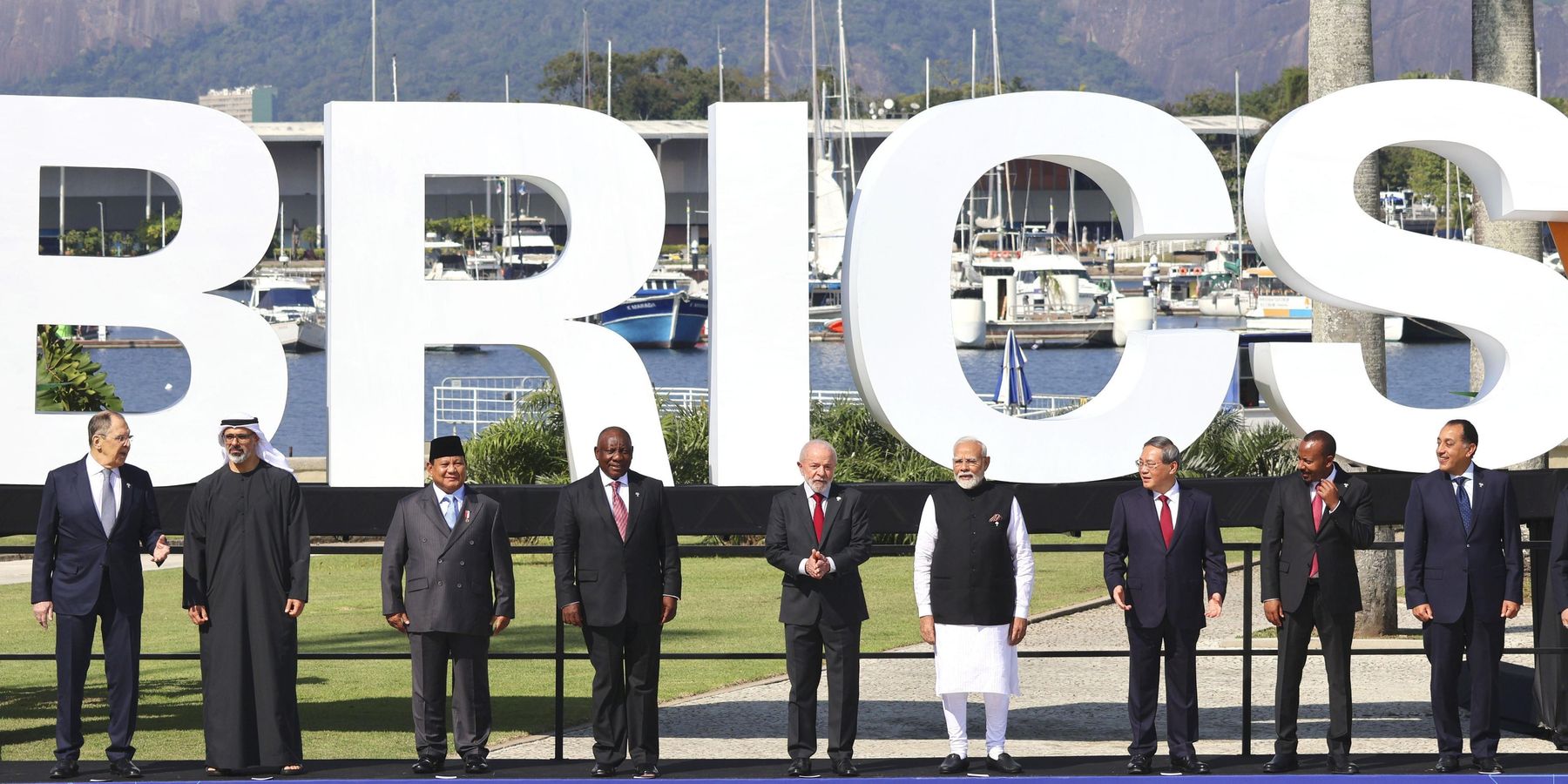The BRICS summit in Rio de Janeiro, Brazil has issued its leaders’ declaration, with a significant section on geopolitics and security and particular criticism of Israel’s recent bombing of one of its newest members — Iran — and its war on Gaza.
The Rio summit represented the BRICS at its biggest so far: 10 full members, and 10 partner countries. Indonesia was this year's new member. In a world of increasing tensions and conflict, BRICS decided to wade deeper into questions of geopolitics and hard security but managed to forge an impressive consensus on these questions.
BRICS is not a formal organization but rather a loose coalition of what I have called the “global east” (Russia and China) and several global south states. Following its first leaders’ summit in 2009 as BRIC (Brazil-Russia-India-China), South Africa joined to make it BRICS. Post-2023, five new members have been added (Egypt, Ethiopia, Indonesia, Iran, and the United Arab Emirates), and 10 partner countries have been announced at a lower tier of participation.
BRICS' original mandate of addressing global economic and collective action challenges and strengthening the multilateral order expectedly remained the biggest focus of this year’s declaration, including substantial paragraphs devoted to development finance, health, trade, and climate change, among others.
BRICS has traditionally been focused on economic coordination but has increasingly been wading into fraught geopolitical/hard security questions since the Russia-Ukraine war in 2022. This is an unsurprising effect of the international system turning more conflictual, with more major wars of late than we have seen for a long time. But as this summit showed, BRICS is showing a notable ability to forge consensus on these challenging questions. The Middle East, Africa and South Asia were a bigger focus this year than Ukraine.
In the Middle East context, the U.S. was not mentioned or criticized by name in the declaration, but there were seven critical references to Israel. Israel is criticized implicitly and explicitly on its occupation of Palestinian land, "denial or obstruction of humanitarian access and the targeting of humanitarian personnel," "the use of starvation as a method of warfare," violations of sovereignty and continuing occupation in Lebanon, and the International Court of Justice case lodged by South Africa in 2023.
However, Hamas is not mentioned, nor is the Oct 7, 2023, terrorist attack on Israel. But the "release of all hostages and detainees" is demanded.
Notably, Israel and the United States were not mentioned explicitly in context of the recent war on Iran. But the attacks on Iran were condemned, representing stronger language than the joint statement specifically on this conflict issued by BRICS just two weeks prior to the 2025 summit. The UN Security Council was also invoked in this regard.
On other security fronts, the Pahalgam terror attack on April 22 in Kashmir, India was condemned explicitly, as were attacks on civilian targets in Kursk in Russia. The roles of Pakistan and Ukraine were not mentioned by name in these contexts. The declaration contained significant text on combating terrorism in the specific contexts of India, Syria, and Sudan, and more broadly. Conflicts in Sudan, Syria and Haiti got dedicated paragraphs. The Great Lakes region and Horn of Africa were also mentioned in the security context.
Most of the declaration is taken up, as expected, with a host of non-security issues, including development finance (NDB), food, health, science/space, and education. Climate, a top Brazilian priority, gets a major section, linked to development. The declaration rejected the EU's Carbon Border Adjustment Mechanism as protectionist. The declaration also criticized recent U.S. trade policies by expressing “serious concerns about the rise of unilateral tariff and non-tariff measures which distort trade and are inconsistent with WTO rules."
Finally, BRICS sees the world as already multipolar. Multipolarity was both recognized as a reality and encouraged in the document. The text mentions "the context of the contemporary realities of the multipolar world." and supports "fostering (a) multipolar world" in the G20 context. It also states that "multipolarity can expand opportunities for emerging markets and developing countries to develop their constructive potential"
In response Sunday, President Donald Trump declared on his Truth Social that any country that aligned with BRICS policies would get slapped with an additional 10% tariff. Countries are awaiting final tariff news as the July 9 "liberation day" deadline looms.
- How the Global South is reacting to events in Israel and Gaza today ›
- How Trump’s dump on de-dollarization affects BRICS ›
















